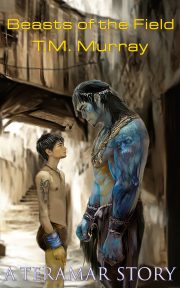Sudden: Writing on the Go
by Eugen Bacon
Editor’s note: This piece is part of an occasional series titled Writing by Other Means, in which authors share personal experiences and industry intel around different production contexts and writing tools.
You have a novel, a novella, a short story in your head—you just need to write it. The muse is humming, no shortfall of ideas. But you need that time, an hour or three, to sit at your workstation, perhaps with noise-cancelling headphones, to zone out the world, get on with it.
But your day job is a beast—roaring its demands. The boss is a monster, or maybe you’re the boss on a snarl. The minute you’re home, domesticity rushes at you in the face of a pug or a Weimaraner spoiling for a run in the park, a coon cat or a Persian arching its back and rubbing at your shins, almond-shaped eyes glowing, MEOW—where’s the trout? Perhaps it’s a kiddie—even grown, they act like they’re four, keening for your attention: Mom, Da, are you listening? Perhaps it’s your mate—angling to unload about one helluva day. All contending with your laundry, the vacuum cleaner, the stove, the dishwasher…
There goes your workstation, no getting on with it. The heck do you get time to write?
Enter sudden writing.
It works in chunking. Spurting in bite size.
Think of a novel. Think of how many mini-scenes you can extract from it. Right from the onset of writing. Your mini-scene could be in crafting the synopsis, way before you write. Or in shaping out a chapter-by-chapter breakdown. Now you’re writing: There’s the opening hook…Maybe there’s the inciting incident that kindles your hero/ine from their ordinary world to adventure…
- the obstacles—real or imagined to their quest
- their interaction(s) with a mentor—a friendly stranger, someone who inspires them to take up a gauntlet
- their encounters with allies, enemies, conflict, conflict
…all the way to a closing. Doesn’t matter your approach—it doesn’t have to be the hero/ine’s journey. Each tiny episode, be it a character journey, interaction, or event, is a mini-scene. You could break down your novel into thousands of mini-scenes, each with a beginning, a middle, and an end.
Think of a short story—the scores of inherent mini-scenes. Moments in time. It could be an argument between characters. Or a love scene. Or your protagonist moving from A to B. Less than half a page of intensity and immersion, ten to fifteen minutes of a solo scene in your head, in a scribble, in your phone. Focus on that one moment, as you wait for the traffic lights to change, for your turn in a queue, as you warm a cuppa in the microwave. As you run Milo in the park (most likely it’s Milo running you)…As you crack open a can of wet food for Mittens…As you soak (finally) in the soapiest suds.
Getting started
Write on the go: jot down points that are little triggers for the scene you’re going to write. Draw the scene in your head, on a pad, in your phone. With simple word or phrase prompts, craft the bones of a sharp and meaningful conversation. Hone that fight scene, the sequence of it: who pulls what arm, which way does the blade swing? Dance your protagonist in your head, so vivid. Yelp, punch. Spin, snatch, run. One moment. Focus on “sudden”—one mini-scene, a piece of your story. It doesn’t have to be perfect, just chart the essentials.
Here’s a moment in time that I scratched in a minute, prose-poetic scribbles on the go:
Who was a trick question
He saw a woman with eyes whose beauty
radiant as a summer meadow
he thought of
~sweet peas
~roses
~dahlias
~lilies
Was she punishment or consolation
Was he a wolf or a dog?
It was the essence of a scene:
He found a woman named Dash who was a trick question. Her beauty was a radiant summer meadow, and he thought of the pink, salmon and white of dew-kissed sweet peas, the sunniest yellow of baby-fresh dahlias, the rarity of blue and peach roses that weren’t the popular kind because they self-picked where they grew, and the purpliest lilies that belonged in a wedding, and buzzed pureness and a hint of coquetry. Was she punishment or consolation? And was he a wolf or a puppy?
And here’s dialogue, journaled on the go:
You have uncertainty about everything
Even me
Especially us
It was convenient for you to stay away. You didn’t have to make a decision.
About you?
About us.
Is this just physical?
Unfair. Sure, sex is a sweetness, nectar, connection, feelings.
Guavas.
A minute of sudden fiction shaped out a mini-moment between vulnerable lovers navigating their feelings, fleshing out my novel on the go (character names have changed):
Zed is still as if she has died. Then her words slip out quietly.
“Must you do that? Bring uncertainty to everything?”
“Even you?” asks Bree, doubtful she’s heard right.
“Especially me. It was a convenience for you to stay away. That way, you didn’t have to decide. Anything.”
“About you?”
“About us. Bree, is this just physical for you?”
“It’s unfair of you to ask that. Sure, our sex is a sweetness, nectar from the gods. But, of course, there’s connection and feelings.”
Zed listens with such hunger, clinging to every word as if she were a fish, and it water.
“Feelings? Such as?”
“I mean. I like you a lot,” says Bree. “I really, really like you.”
“And I like guavas. I really, really like them.”
When it’s hard to write full-time without life’s distractions, why wait for a long stretch of crafting at a workstation that might never happen?
Stay prolific
Chunk your project into doable “minis.” Draw on the flexibility and experimentation of sudden fiction, spurts of prose poetry to write on the go.
This approach mostly works when ideas are flowing—what you’re lacking is time. As you draft your creative text through journaling, notes, and scrawl mini-episodes physically or in your mind, each vignette shapes the sum of a whole. You might be astonished to discover how powerful these bursts of creative minis can be.
Later, when you’ve got time, you have all the minis to develop into robust scenes.
 Eugen Bacon is an African Australian author. She’s a British Fantasy and Foreword Indies Award winner, a twice World Fantasy Award finalist, and a finalist in other awards, including the Shirley Jackson, Philip K. Dick Award, as well as the Nommo Awards for speculative fiction by Africans. Eugen was announced in the honor list of the Otherwise Fellowships for “doing exciting work in gender and speculative fiction.” Danged Black Thing made the Otherwise Award Honor List as a “sharp collection of Afro-Surrealist work.” Visit her at eugenbacon.com.
Eugen Bacon is an African Australian author. She’s a British Fantasy and Foreword Indies Award winner, a twice World Fantasy Award finalist, and a finalist in other awards, including the Shirley Jackson, Philip K. Dick Award, as well as the Nommo Awards for speculative fiction by Africans. Eugen was announced in the honor list of the Otherwise Fellowships for “doing exciting work in gender and speculative fiction.” Danged Black Thing made the Otherwise Award Honor List as a “sharp collection of Afro-Surrealist work.” Visit her at eugenbacon.com.



